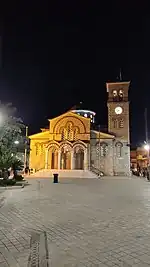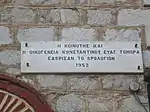Merbaka
Merbaka (Greek: (το) Μέρμπακα (n.) or Greek: (ο) Μέρμπακας, romanized: Merbakas (m.)) is a village and local community of the municipal unit of Midea, in the deme (municipality) of Nafplio, in the periphery of Argolis, in the Peloponnese region.[1]
Agias Trias (Merbaka)
Αγίας Τριάς Μέρμπακα | |
|---|---|
 The principal modern church, that of the Holy Trinity, in the village square | |
| Etymology: William of Moerbeke | |
| Coordinates: 37°38′N 22°48′E | |
| Country | Greece |
| Region | Peloponnese |
| Area | |
| • Total | 4,095 km2 (1,581 sq mi) |
| Elevation | 30 m (100 ft) |
| Population (2011) | |
| • Total | 1,151 |
| • Density | 0.28/km2 (0.73/sq mi) |
| Time zone | UTC2 |
| Postal codes | 21055 |
| Area codes | 2752 |
| ISO 3166 code | GR-J |
| Car plates | AP |
Name
Merbaka is the village's traditional name, but officially it is called Agia Trias (Greek: Αγία Τριάς) in Katharevousa, or Greek: Αγία Τριάδα, romanized: Agia Triada in Demotic). The village was officially renamed on December 29, 1953,[2] in keeping with a broader program of Hellenization of geographical names in Greece.
While the village was considered historically to be inhabited by Arvanites who speak Arvanitika, today it is considered more assimilated, in comparison to the Arvanitika villages of Midea and Manesis.[3]
Merbaka is thought to have been named for William of Moerbeke, a 13th-century Roman Catholic archbishop of Corinth, scholar and Philhellene from Flanders. A roughly contemporaneous Byzantine-Gothic Church of the Dormition of the Mother of God (Greek: Ναός της Κοίμησις Θεοτόκου, popularly known as Παναγία της Βούζης, Panagia tis Bouzis, "Our Lady of Bouzis") in the village may have been built under his auspices.[4] The church's popular name is held to have come from a prominent Lemnian family of landowners who donated the land for a mediaeval monastery nearby; their name and social position is attested by contemporaneous documents with the seal of Michael VII Doukas. The monastery was sited further inland from its existing twin, the Monastery of Areias near Nafplio – popularly known as "The Holy Mountain" — to protect the monks and ecclesiastical property from piratical raiding.[5]
Merbaka's official name likely stems from the inclusion of three "saints" on a re-used Classical pediment on the thirteenth-century church: villagers likely interpreted these figures as a representation of the Holy Trinity, and unofficially renamed the church to reflect this; in time, the name was applied to the new church, and later, to the village itself. The older church includes other recycled antiquities like a Roman dedication, in Latin, to Quintus Caecilius Metellus Creticus, a Roman proconsul in Greece who was noted for his suppression of piracy.[4]
History
From the end of the Sixth Ottoman-Venetian War to 1770, when it was attacked by bandits, Merbaka was the seat of the Orthodox Metropolis of Nauplion and Argolis, due to the Venetian imposition of a Latin bishop at Argos.

The modern church of the Holy Trinity, first erected in 1898, was torn down and rebuilt in 1934.[6] A plaque on the front of the belltower says that the clock was donated in 1952.
Merbaka is part of the municipal unit of Midea. According to the 2001 Greek census, the village had a population of 1,267 inhabitants. Before the Kapodistrias plan, and the Kallikratis Programme, the village was part of the Nafplia Province in the nome (prefecture) of Argolis , in the geographic region of the Peloponnese. [7]: 147 [8]: 406
Notable people
- Theofanis Tombras - former general manager of OTE and alleged participant in the "Koskotas scandal", for which he was acquitted; born in Merbaka, he became engaged in the fruit-processing business in Argolis, which continued after his retirement from public life
References
- "Μέρμπακας" [Merbakas] (in Greek). statistics.gr. Retrieved 2023-03-21.
- "Merbaka—Agias Trias". Institute for Neohellenic Research, Name Changes of Settlements in Greece. Retrieved 30 July 2015.
- Lawrence, Christopher M. (2007). Blood and Oranges European Markets and Immigrant Labor in Rural Greece. Berghahn Books. p. 11. ISBN 9781845453077.
- Prof. Gary Reger, An Athenian Diary "An Athenian Diary". Archived from the original on 2011-08-13. Retrieved 2010-05-10. Retrieved May 10, 2010.
- Argolikos Archival Library of History and Culture, «Τοποθεσία του Βούζη = Μέρμπακας;» ("Does the place-name of Bouzis = Merbaka? - in Greek)
- The Reverend Oeconomos Anastasios Salapatas, Μέρμπακα: Η Εκκλησία της Αγίας Τριάδος . 18 September 2009. Retrieved May 10, 2010.
- ""Merbaka"". Papyrus Larousse. 1963.
- "Μέρμπακα". Πάπυρος Λαρούς Μπριτάνικα [Papyrus Larousse Britannica] (in Greek). Papyrus. 2006.